Are you confused about the right tire size for your 2017 Jeep Cherokee? Finding the perfect fit isn’t just about appearance—it directly impacts your vehicle’s performance, fuel efficiency, and safety on the road.
Whether you’re replacing worn tires or upgrading for better off-road capability, knowing your Cherokee’s proper tire specifications is essential. The 2017 Jeep Cherokee comes with several factory tire size options depending on the trim level, with the most common being 225/60R17, 225/65R17, and 245/65R17. Understanding these numbers can save you money and prevent potential damage to your vehicle’s systems.
Understanding 2017 Jeep Cherokee Tire Sizes
The 2017 Jeep Cherokee tire size specifications are coded in a string of numbers and letters that reveal crucial information about the tire’s dimensions and capabilities. Each component of this code tells you something exact about the tire’s design and performance characteristics.
Decoding Tire Size Markings
Tire size markings follow a standardized format that provides detailed specifications. For example, in a common Cherokee tire size like 225/60R17:
- 225 represents the tire width in millimeters from sidewall to sidewall
- 60 indicates the aspect ratio (the height of the tire’s cross-section as a percentage of its width)
- R signifies radial construction, which is standard for most modern tires
- 17 shows the wheel diameter in inches
These numbers aren’t arbitrary—they’re precise measurements that determine how your Cherokee handles on different terrains. During my years reviewing Jeep vehicles, I’ve noticed drivers who understand these specifications make more informed decisions when replacing tires.
Load and Speed Ratings
Beyond the basic dimensions, Cherokee tire specifications include important performance indicators:
| Rating Type | Example | Meaning |
|---|---|---|
| Load Index | 99 | Maximum weight capacity (in this case, 1,709 pounds per tire) |
| Speed Rating | H | Maximum safe speed (130 mph) |
Load ratings are particularly important for Cherokee owners who regularly carry heavy cargo or tow trailers. One customer, Sarah from Colorado, told me her Cherokee’s handling improved dramatically after she switched to tires with the appropriate load rating for her camping gear.
Seasonal Designations
The 2017 Cherokee’s tires also feature seasonal designations that indicate their optimal performance conditions:
- All-Season (A/S): Balanced performance in most conditions
- Mud and Snow (M+S): Enhanced traction in light snow and mud
- Winter/Snow (Mountain Snowflake Symbol): Specifically designed for severe winter conditions
- All-Terrain (A/T): Balanced on-road comfort with off-road capability
Cherokee owners in diverse climates benefit from selecting tires that match their typical driving conditions. The factory-equipped all-season tires work well for most drivers, but those in extreme environments often upgrade to specialized options.
Factory Tire Specifications for the 2017 Jeep Cherokee
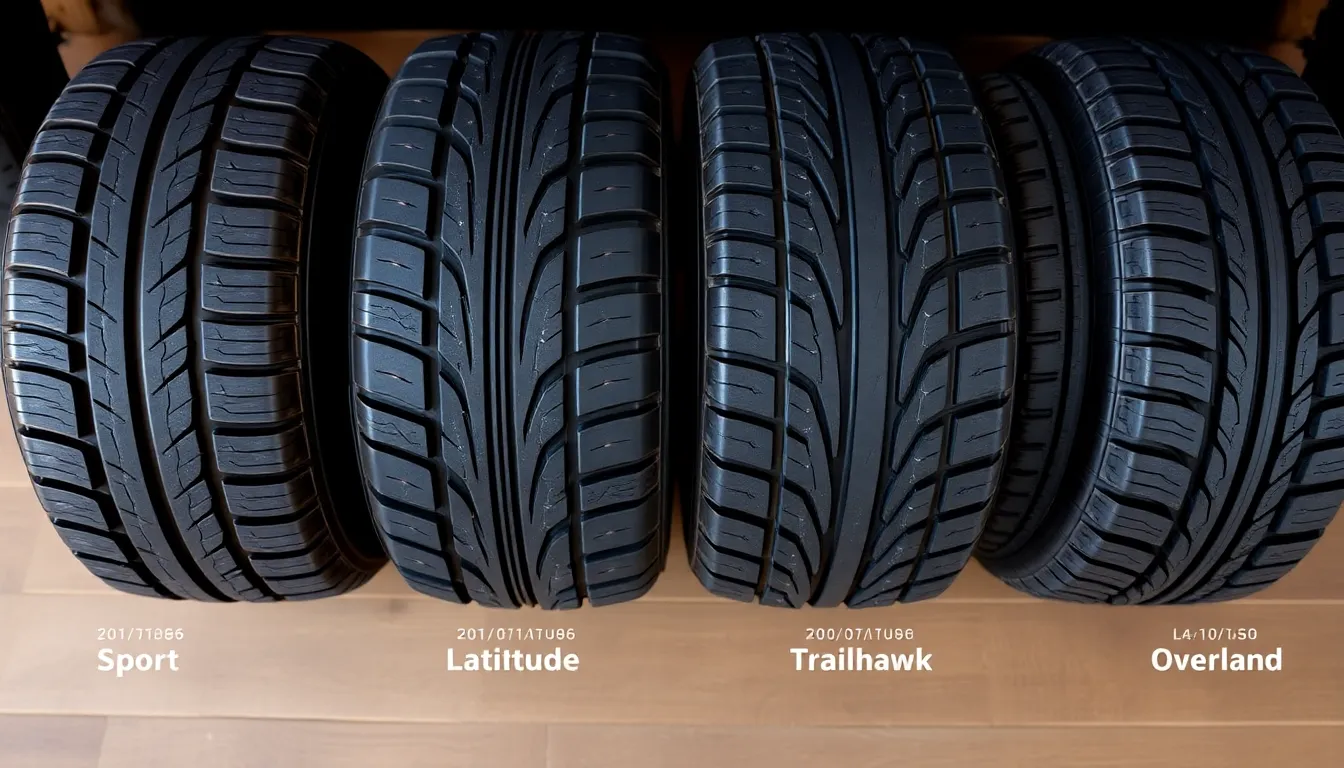
The 2017 Jeep Cherokee offers several tire size options across its different trim levels and drivetrain configurations. Each specification balances factors like comfort, handling, and off-road capability to match the intended use of each model variant.
Sport and Latitude Models
Sport models come with different tire sizes based on their drivetrain configuration. The Sport 2-wheel drive version features either 225/60R17 or 225/55R18 tires, providing good on-road comfort and fuel efficiency. For Sport 4-wheel drive models, Jeep equips slightly taller 225/65R17 or 225/60R18 tires that offer additional ground clearance for light off-road use.
Latitude trims follow a similar pattern with exact tire sizes for each drivetrain option. The Latitude 2-wheel drive models use 225/60R17 tires as standard equipment. Latitude 4-wheel drive variants come with 225/65R17 tires that provide a good balance between on-road comfort and off-road capability.
Limited and Trailhawk Models
Limited models feature more premium tire options to complement their upscale positioning. The Limited 2-wheel drive comes equipped with 225/55R18 tires that enhance on-road handling characteristics. Limited 4-wheel drive models receive slightly taller 225/60R18 tires that maintain refined road manners while adding versatility for occasional off-pavement excursions.
Trailhawk models stand apart with their specialized 245/65R17 tires. These wider tires (245mm versus the standard 225mm) provide superior traction in challenging off-road conditions. The Trailhawk’s unique tire specification supports its position as the most capable off-road variant in the Cherokee lineup, with enhanced grip for rock crawling and muddy terrain.
The Overland trim rounds out the lineup with 225/55R18 tires for 2-wheel drive models and 225/60R18 tires for 4-wheel drive versions, offering premium comfort and quiet operation for this luxury-oriented variant.
Decoding Tire Size Numbers on Your 2017 Jeep Cherokee
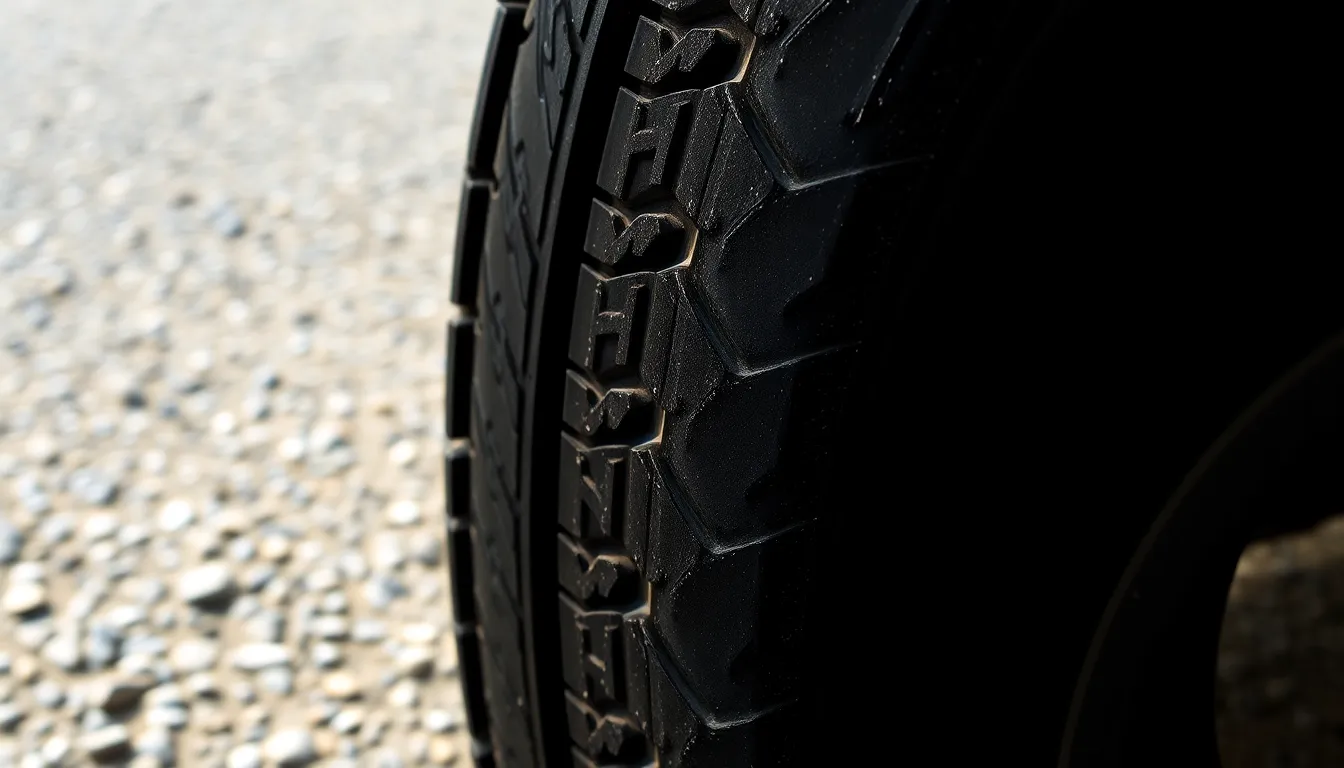
Understanding tire size markings helps you make informed decisions when replacing tires on your Jeep Cherokee. These alphanumeric codes contain critical information about dimensions and capabilities that ensure proper fitment.
What the Numbers and Letters Mean
Tire size codes follow a exact pattern that conveys essential measurements. In a common 2017 Jeep Cherokee tire size like 225/60R17, each component represents a exact dimension. The first number (225) indicates the tire width in millimeters measured from sidewall to sidewall. Following the slash, the aspect ratio (60) represents the sidewall height as a percentage of the width – in this case, the sidewall height is 60% of the 225mm width. The letter “R” signifies radial construction, the standard for modern tires. The final number (17) specifies the wheel diameter in inches that the tire fits. Trailhawk models typically use wider 245/65R17 tires for enhanced off-road performance, while other trims like the Latitude use 225/65R17 or 225/60R17 depending on drivetrain configuration.
Finding Your Tire Size Information
Locating your Jeep Cherokee’s tire size information is straightforward. The most direct method involves checking the tire sidewall where manufacturers print all specifications. For factory-recommended sizes, examine the tire information placard typically mounted on the driver’s side doorjamb. This placard displays the manufacturer’s recommended tire size, inflation pressure, and load ratings. Your owner’s manual also contains this information in the technical specifications section. Cherokee trim levels determine the appropriate tire size – Sport and Latitude models generally use 17-inch options, Limited and Overland trims feature 18-inch configurations, while the Trailhawk specifically uses 245/65R17 tires for maximum off-road capability.
Alternative Tire Sizes for the 2017 Jeep Cherokee
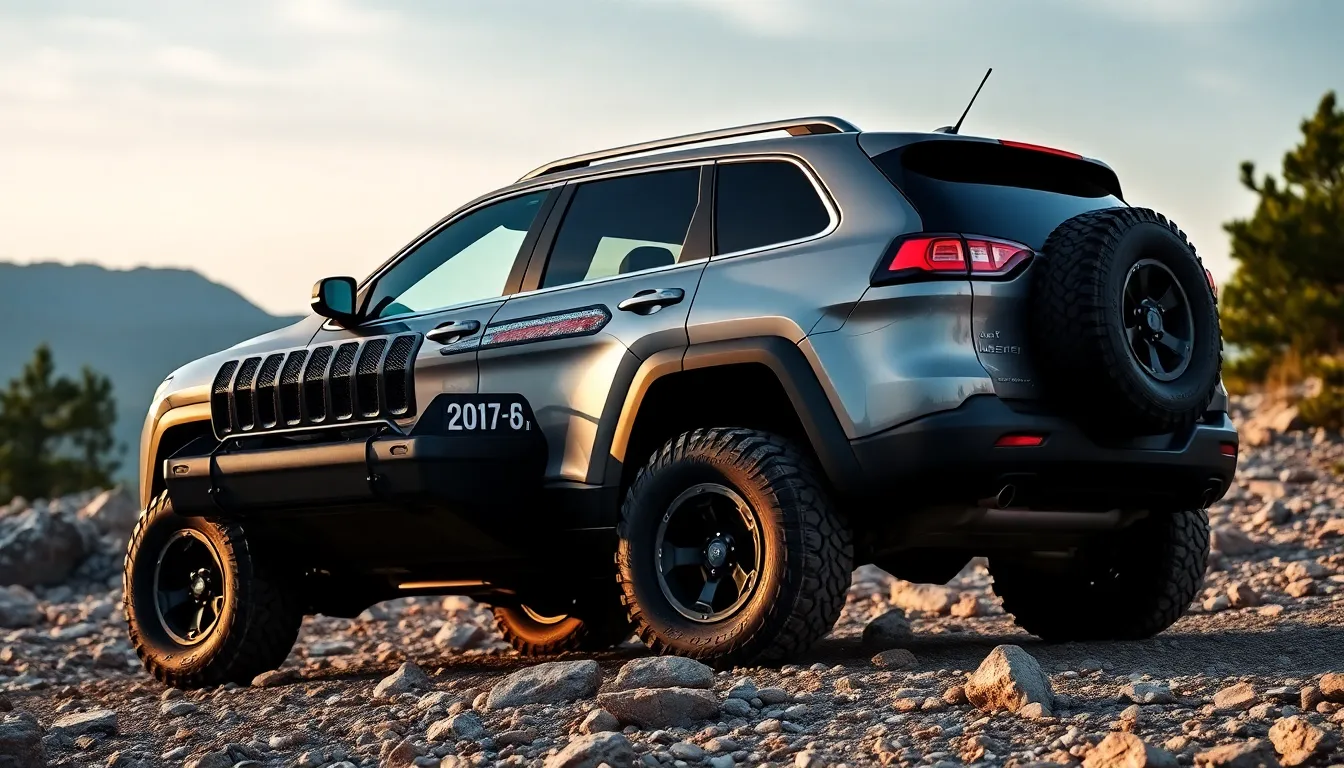
The 2017 Jeep Cherokee accommodates several alternative tire sizes beyond factory specifications, giving you flexibility to customize your vehicle’s performance. These alternatives can enhance exact driving characteristics while maintaining compatibility with your Cherokee’s drivetrain system.
Upsizing Options and Benefits
Increasing your tire dimensions offers tangible performance improvements for off-road enthusiasts. Upgrading from standard 225/60R17 to larger 235/65R17 or 245/65R17 sizes provides greater ground clearance, allowing your Cherokee to navigate rough terrain more effectively. The Trailhawk trim’s factory 245/65R17 tires demonstrate that the Cherokee platform readily accepts these wider, taller options without modification. Larger tires deliver enhanced traction on challenging surfaces, with wider treads distributing vehicle weight across more surface area. Off-road performance benefits significantly from upsized tires, particularly when traveling over loose gravel, mud, or rocky terrain. The aesthetic improvement is notable too, as larger tires fill wheel wells more completely, giving your Cherokee a more aggressive, capable appearance.
Downsizing Considerations
Selecting smaller tire dimensions comes with exact trade-offs worth evaluating before making changes. Downsizing to 215/60R17 tires can improve fuel economy by reducing rolling resistance and decreasing rotational mass, resulting in less energy required to move your wheels. Smaller tires typically cost less than their larger counterparts, potentially saving money during replacement cycles. Vehicle handling characteristics change with downsized tires, sometimes offering more responsive steering but at the expense of reduced ground clearance. Speedometer accuracy becomes affected when important size changes occur, as your vehicle’s electronics calibrate based on factory tire dimensions. Maintaining an overall diameter close to original specifications prevents drivetrain stress and keeps brake sensor systems functioning correctly. The sidewall height requires careful consideration during downsizing to preserve ride comfort, especially if you frequently travel on rough roads.
How Tire Size Affects Your 2017 Jeep Cherokee’s Performance
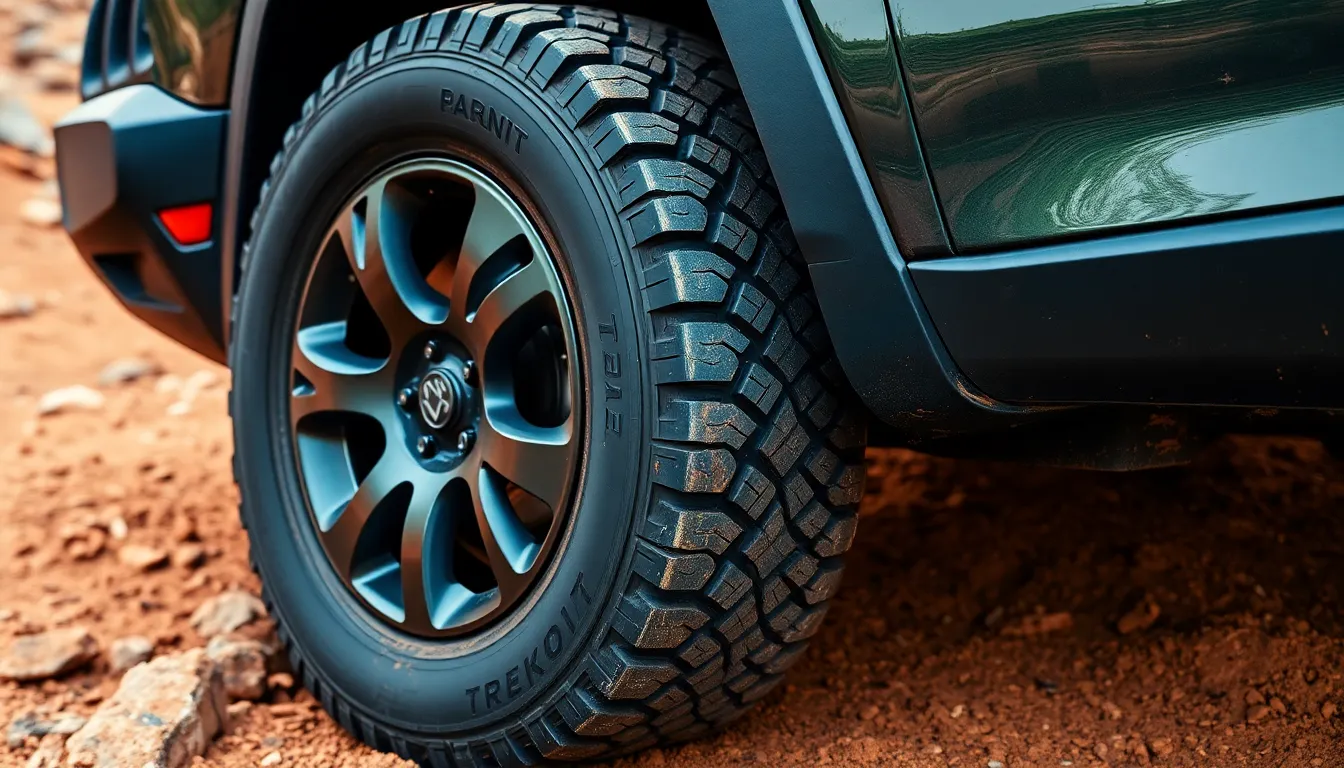
Tire size significantly impacts how your 2017 Jeep Cherokee performs in various driving conditions. The right tire dimensions can enhance or diminish your vehicle’s capabilities depending on your driving needs and preferences.
Off-Road Capability
The 2017 Jeep Cherokee Trailhawk comes equipped with 245/65R17 tires specifically designed to maximize off-road performance. These larger tires provide increased ground clearance, allowing your Cherokee to navigate over rocks, logs, and uneven terrain with greater ease. The wider footprint of these tires creates better traction on loose surfaces such as dirt, mud, and gravel. Off-road oriented tires typically feature more aggressive tread patterns with deeper grooves and reinforced sidewalls that resist punctures from sharp objects on trails. Cherokee models with smaller tires like the 225/55R18 found on the Overland 2WD focus more on road comfort than trail capability, limiting their effectiveness in challenging off-road environments.
Fuel Economy and Handling
Your tire selection creates a direct impact on fuel efficiency and handling characteristics. Smaller, narrower tires such as the 225/55R18 found on Limited FWD and Overland 2WD models reduce rolling resistance, helping your Cherokee achieve better gas mileage during daily commutes. These lower-profile tires also provide more responsive steering and improved cornering stability on paved roads. Conversely, the larger 245/65R17 tires on the Trailhawk trim add weight and increase rolling resistance, resulting in slightly reduced fuel economy. The taller sidewalls of these tires absorb road imperfections better, creating a more comfortable ride on rough roads, but they may feel less precise during quick lane changes or sharp turns on highways. Sport and Latitude trims with 225/60R17 or 225/65R17 tires offer a balanced compromise between fuel efficiency and all-weather capability.
Recommended Tire Brands for the 2017 Jeep Cherokee
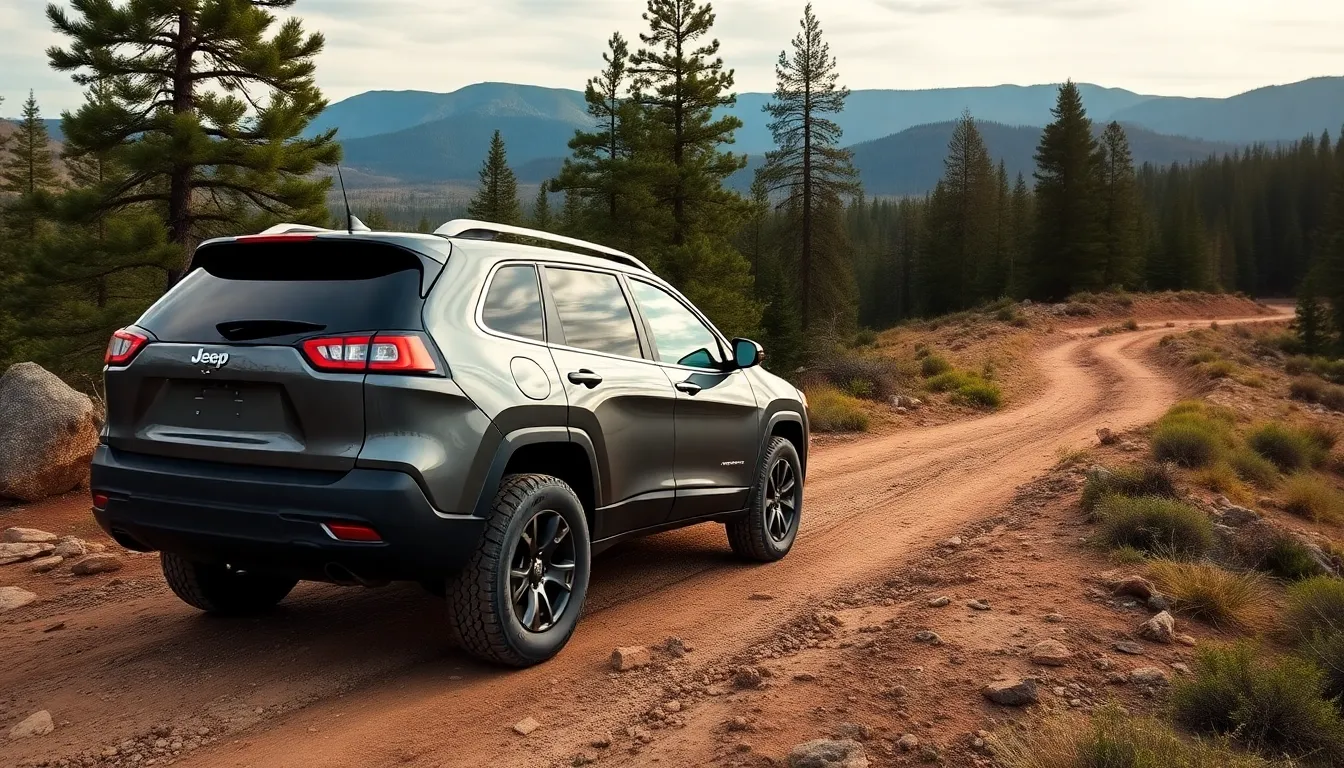
Several high-quality tire brands offer excellent options for your 2017 Jeep Cherokee, with each providing different benefits depending on your driving needs. Goodyear stands out as a prominent brand that perfectly matches OEM tire sizes across various Cherokee trims, ensuring optimal performance and safety. Michelin tires deliver exceptional longevity with mileage warranties ranging from 60,000 to 80,000 miles, making them a cost-effective long-term investment.
For off-road enthusiasts, Firestone Destination A/T tires provide superior traction on rugged terrain, particularly complementing the Trailhawk’s adventurous capabilities. BFGoodrich offers versatile options that balance on-road comfort with moderate off-road performance, ideal for Cherokee owners who occasionally venture off the beaten path. Bridgestone Dueler LX tires excel in everyday city and highway driving conditions, delivering a smooth, quiet ride for your daily commute.
Price points for quality tires typically range from $110 to $250 per tire, varying based on size and performance characteristics. All-terrain options generally command higher prices than standard highway tires due to their specialized tread patterns and more robust construction. Regular maintenance practices like monthly air pressure checks and 5,000-mile tire rotations significantly extend tire life, maximizing your investment regardless of which brand you choose.
When selecting between these brands, consider matching the tire type to your Cherokee’s trim level and typical driving conditions. The Trailhawk model performs best with dedicated all-terrain tires like the 245/65R17 size, while Latitude and Limited models benefit from all-season options in their respective 225/60R17 or 225/55R18 sizes. Sport and Overland trims equipped with 2WD configurations achieve optimal fuel efficiency with highway-focused tires that reduce rolling resistance while maintaining good wet traction.
Seasonal Tire Options for Your Jeep Cherokee
Seasonal tire selection dramatically impacts your 2017 Jeep Cherokee’s performance across different weather conditions and terrains. All-season tires offer balanced performance in various conditions, making them ideal for daily commuting and highway driving. Bridgestone Dueler LX exemplifies this category, providing reliable traction on both wet and dry pavement while maintaining reasonable fuel efficiency.
All-terrain tires enhance your Cherokee’s capability when venturing off the beaten path. Firestone Destination A/T tires deliver superior grip on gravel, dirt, and light snow while still performing adequately on paved roads. These tires complement the Trailhawk trim’s 245/65R17 size particularly well, maximizing its already impressive off-road potential.
Winter tires become essential for Cherokee owners facing harsh winter conditions with heavy snow and ice. These specialized tires use unique rubber compounds that remain flexible in freezing temperatures and feature aggressive tread patterns for maximum winter traction. Mounting winter tires on your Cherokee before the first snowfall ensures safer handling and shorter stopping distances when road conditions deteriorate.
Proper maintenance extends your tire’s lifespan regardless of which seasonal variety you choose. Monthly air pressure checks prevent uneven wear patterns and maximize fuel economy. Tire rotation every 6,000 miles distributes wear evenly across all four tires, potentially doubling their service life compared to neglected tires.
Tire costs vary based on size and performance characteristics, with prices typically ranging from $110 for basic all-season options to $250+ for premium all-terrain or winter-exact tires. Premium tires often justify their higher price through extended tread life, improved fuel economy, and enhanced performance in challenging conditions.
Conclusion
Your 2017 Jeep Cherokee’s tire size directly impacts its performance handling and fuel efficiency. Whether you stick with factory specifications or explore alternative sizes you now have the knowledge to make informed decisions for your vehicle’s needs.
Remember that proper tire maintenance is just as important as selecting the right size. Regular pressure checks and rotations will extend your tires’ lifespan regardless of which option you choose.
By matching your tire selection to your driving habits and local conditions you’ll enhance your Cherokee’s capabilities while ensuring safety on and off the road. The right tires aren’t just about specifications—they’re about optimizing your driving experience for years to come.
Frequently Asked Questions
What are the standard tire sizes for a 2017 Jeep Cherokee?
The standard tire sizes for a 2017 Jeep Cherokee vary by trim level. The most common factory sizes are 225/60R17, 225/65R17, and 245/65R17. Sport models typically use 225/60R17 (2WD) or 225/65R17 (4WD), while Limited models offer 225/55R18 (2WD) or 225/60R18 (4WD). The off-road focused Trailhawk comes with specialized 245/65R17 tires for better traction on rough terrain.
How do I read tire size markings on my Jeep Cherokee?
Tire size markings (like 225/65R17) contain key information: the first number (225) is the width in millimeters, the second number (65) is the aspect ratio (sidewall height as a percentage of width), the letter (R) indicates radial construction, and the final number (17) is the wheel diameter in inches. Additional markings include load index and speed rating, which indicate weight capacity and maximum safe speed.
Can I use larger tires on my 2017 Jeep Cherokee?
Yes, you can upsize to larger tires such as 235/65R17 or 245/65R17 for enhanced off-road performance, greater ground clearance, and improved traction. However, significantly larger tires may cause rubbing issues, affect speedometer accuracy, and potentially reduce fuel economy. Always ensure the load rating matches or exceeds your vehicle’s requirements.
Will changing tire size affect my fuel economy?
Yes, tire size directly impacts fuel economy. Smaller tires generally reduce rolling resistance, leading to better gas mileage. Larger, wider tires, especially those with aggressive tread patterns, create more rolling resistance and can decrease fuel efficiency by 1-2 MPG. The additional weight of larger tires also requires more energy to rotate, further affecting fuel consumption.
Where can I find my Jeep Cherokee’s recommended tire size?
You can find your Jeep Cherokee’s recommended tire size in three places: on the sidewall of your current tires, on the tire information placard located on the driver’s side door jamb, or in your owner’s manual. The placard provides the manufacturer’s specifications for tire size, pressure, and load capacity specific to your vehicle’s trim level.
What tire brands are recommended for the 2017 Jeep Cherokee?
Recommended tire brands for the 2017 Jeep Cherokee include Goodyear, Michelin, Firestone, BFGoodrich, and Bridgestone. Goodyear offers excellent all-season performance, Michelin provides premium longevity, Firestone delivers good value, BFGoodrich excels in off-road capabilities, and Bridgestone offers a balance of comfort and performance. Quality tires typically range from $110 to $250 each.
How does tire size affect off-road performance?
Larger tires improve off-road performance by providing greater ground clearance, allowing the Cherokee to navigate over obstacles more easily. The Trailhawk’s 245/65R17 tires offer better traction on loose surfaces like mud, sand, and gravel. Wider tires provide a larger contact patch for improved grip, while taller sidewalls absorb impacts better on rough terrain.
Are winter tires necessary for my Jeep Cherokee?
Winter tires are recommended if you regularly drive in snowy or icy conditions. Despite the Jeep Cherokee’s 4WD capabilities, winter tires provide significantly better traction in cold weather due to their specialized rubber compounds that remain flexible in low temperatures and tread patterns designed to grip snow and ice. They offer shorter stopping distances and improved handling in winter conditions.
How often should I rotate the tires on my Cherokee?
Rotate your Jeep Cherokee’s tires every 6,000-8,000 miles or according to your owner’s manual recommendations (typically every 5,000-7,500 miles). Regular rotation ensures even tire wear, extending tire life by up to 20%. For most Cherokees, a cross rotation pattern is recommended, where front tires move to the opposite rear position and rear tires move forward on the same side.
Can I mix different tire sizes on my Jeep Cherokee?
No, you should not mix different tire sizes on your Jeep Cherokee. Using different sizes can damage the 4WD system, affect handling, trigger warning lights, and potentially void your warranty. All four tires should be the same size, brand, and model with similar tread wear to ensure proper performance and safety, especially in all-wheel drive and 4WD vehicles.
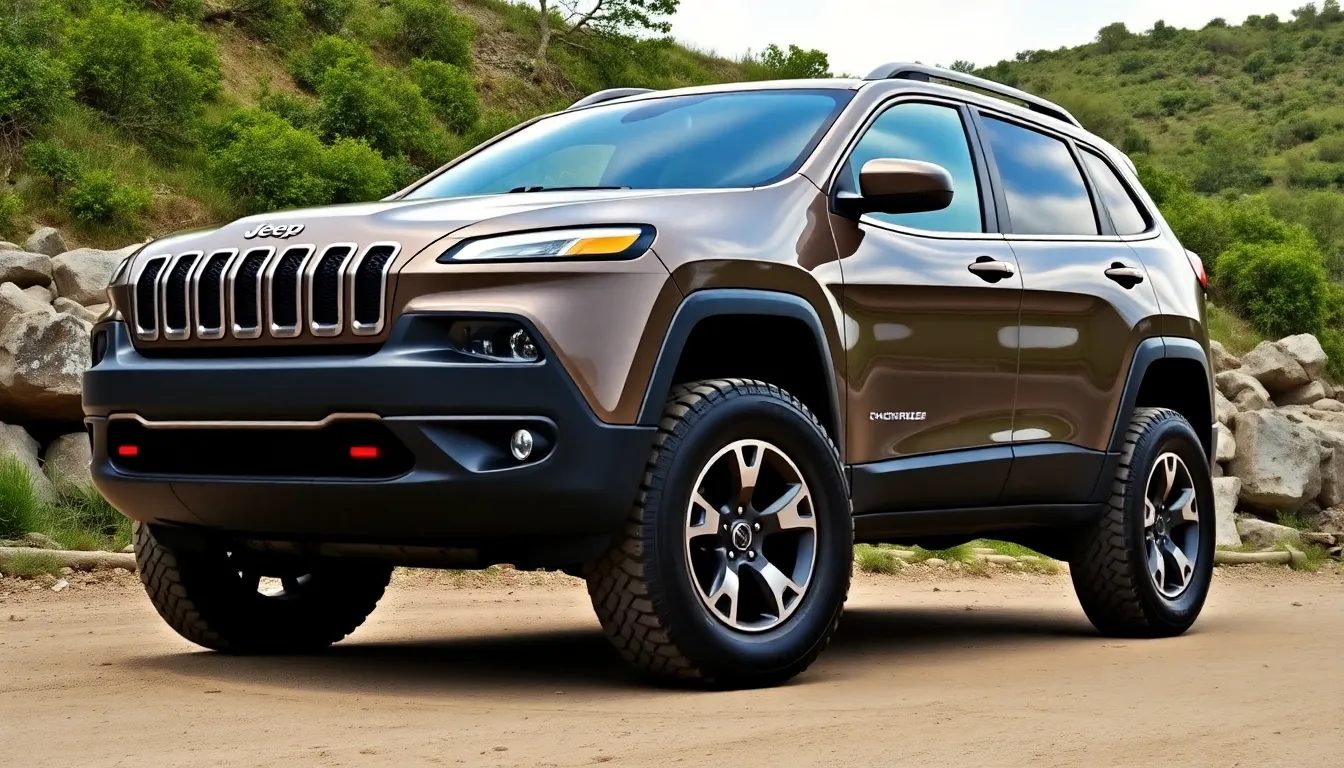
I just could not depart your site before suggesting that I extremely enjoyed the standard info a person provide for your visitors? Is gonna be back often to check up on new posts